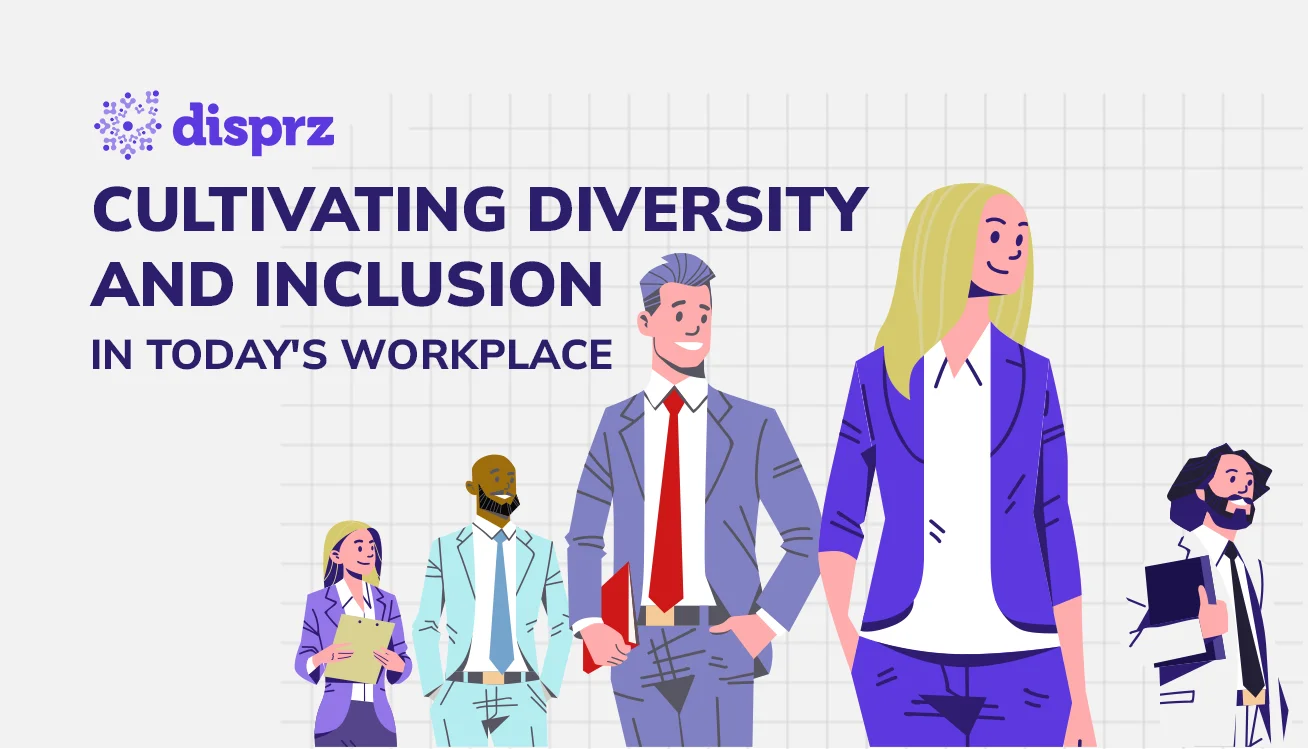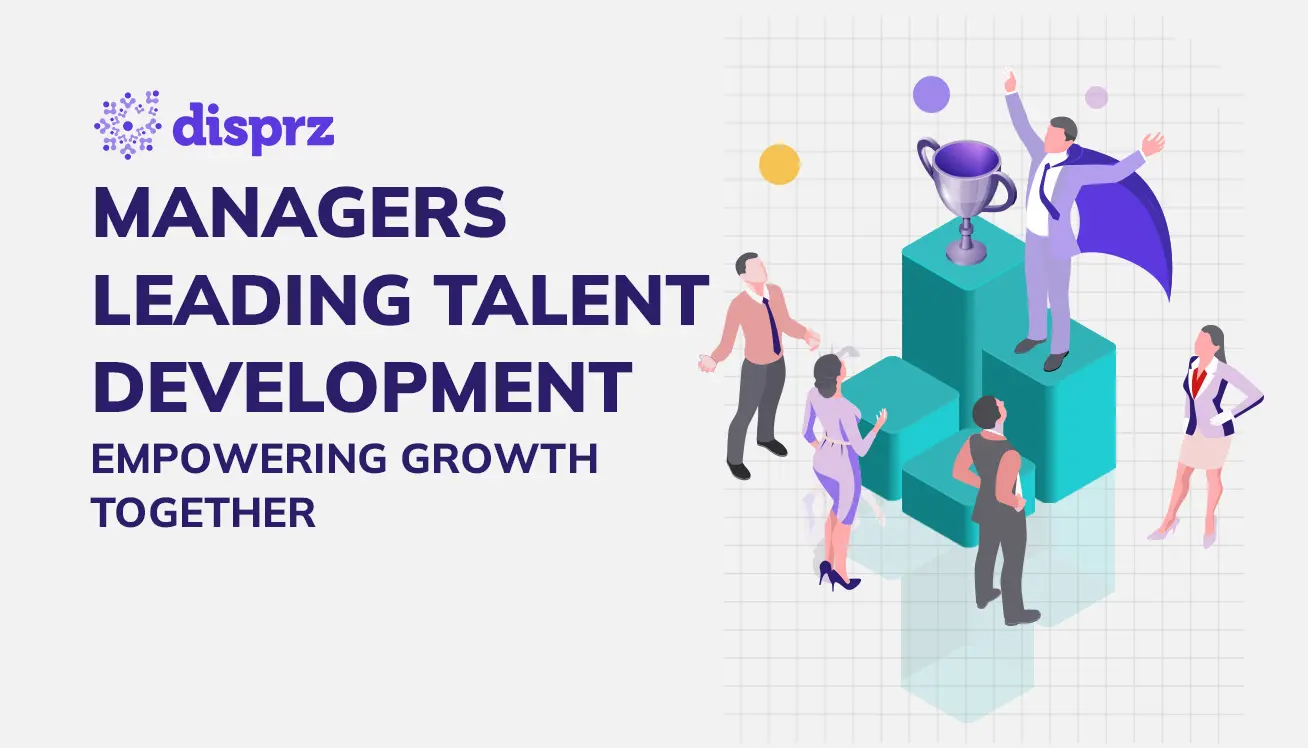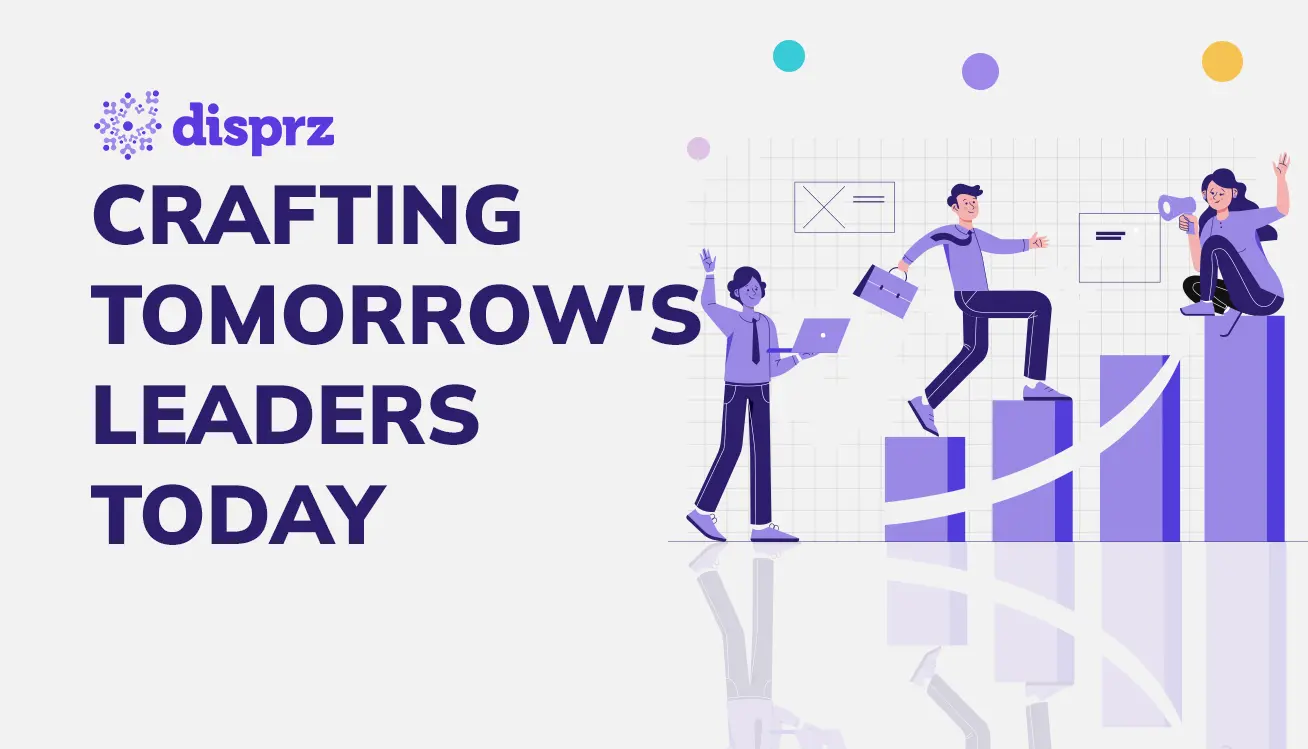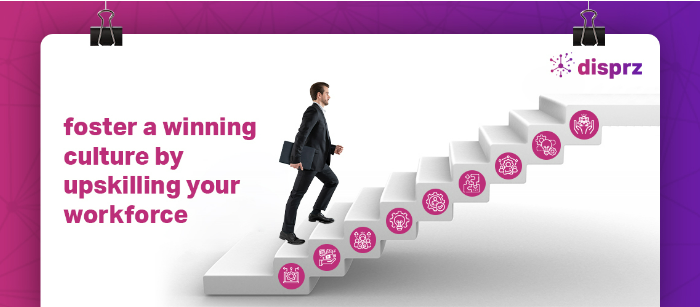
6 min read
• 25 Apr 2024
Top Benefits of Upskilling Your Employees
Upskilling your employees is vital to continuously boost employee growth. Discover the top benefits of upskilling your employees in 2024.
-
eBookEmployee Upskilling - A Detailed Blueprint For Building A Skills-Driven Learning Culture
Business Insider forecasts a 55% chance of a recession in 2023. The economic damage triggered by Russia and Ukraine this year is anticipated to have a multi-prolonged effect on global businesses in the coming year. Under pressure to slash costs and survive in the constantly shifting economy, companies are considering job cuts. These cuts are leading to limited resources and making it crucial for companies to strengthen their current workforce by providing continuous development through upskilling.
Achieve the benefits of upskilling not only helps employees but also aid companies in meeting their annual productivity goals. Aligning employee skill development with business goals is a win-win for both employees and the company.
What is Employee Upskilling?
Upskilling is the process of improving an employee’s existing skills and expanding their capabilities to perform their current job more efficiently. Improve your employees’ skills helps to:
-
Improve overall employee performance
-
Provide opportunities for internal mobility
-
Ensure company growth
The Need for Upskilling in the Digital Age?
In today's digital age, the need for upskilling is essential for individuals and organizations to remain competitive amidst rapid technological advancements. As industries undergo significant transformations driven by automation and digitalization, the need for updated skills becomes paramount to navigate evolving job markets and maintain relevance.
Job Disruption
One in three jobs faces potential disruption due to automation, emphasizing the urgency of upskilling. With automation targeting repetitive tasks, there's a growing demand for human-centric skills like analysis and problem-solving. Through upskilling, individuals equip themselves to adapt to changing job landscapes and secure their positions in an increasingly automated world.
Digital Skills Demand
Proficiencies in AI, data science, and cybersecurity are not only highly sought after but also crucial for success in the digital era. Upskilling in these areas empowers employees to effectively navigate the complexities of modern business environments. Continuous learning ensures individuals can meet the evolving demands of industries and remain competitive in the job market.
Future-Proof Careers
Continuous upskilling is vital for individuals to future-proof their careers and remain relevant in a rapidly changing job market. By staying updated with the latest technologies and industry trends, individuals can position themselves for long-term success. Through proactive upskilling efforts, individuals can adapt to emerging job roles and seize new opportunities in the digital age.
Upskilling vs. Reskilling
Often, upskilling and reskilling are used interchangeably.
However, these are different L&D strategies focusing on two very different goal sets.
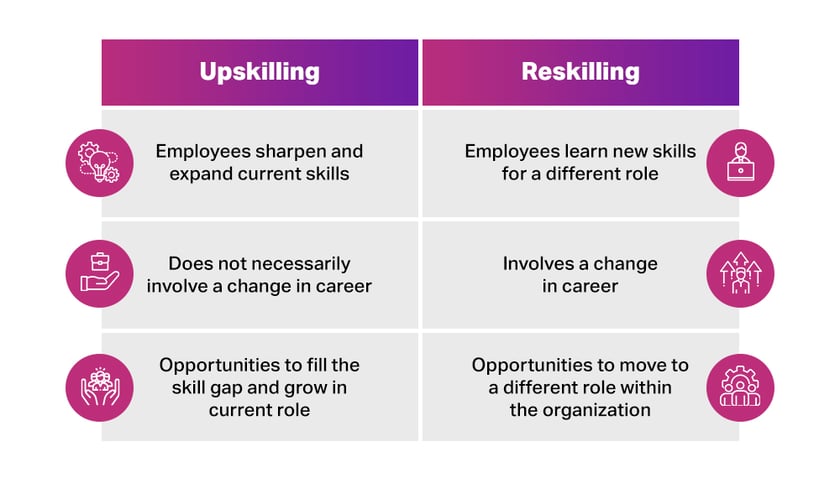
Unlike upskilling, reskilling is a 180-degree pivot to a new role within the company. The employee needs to develop new skills to master a different area of expertise.
6 Benefits of Upskilling for Employees and Organizations in 2024
Upskilling employees enables companies to be more agile and keep pace with the changing skill dynamics.
Amazon’s plan to invest more than “$700 million over the next six years upskilling 100,000 U.S. employees is a reminder that skills become obsolete quickly. This makes continuous skill development the need of the hour for every organization.
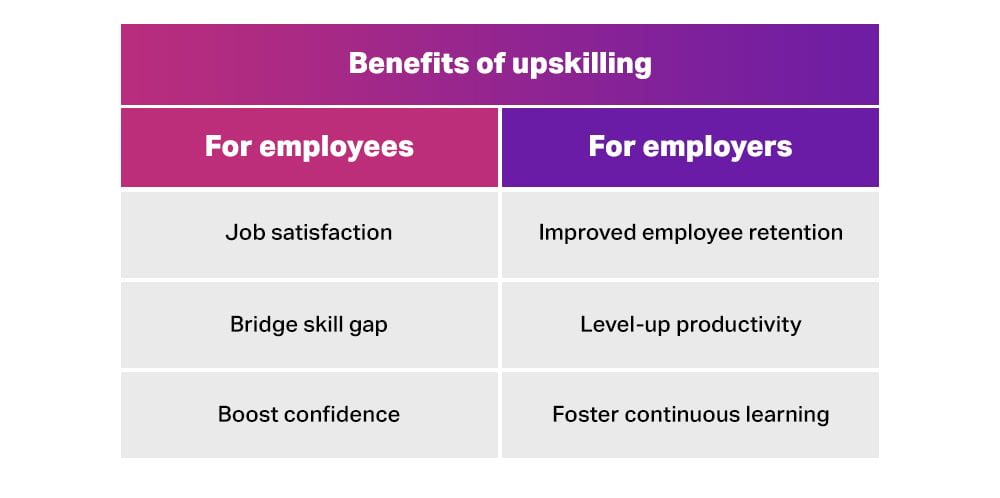
Benefits of Upskilling for Employers
Employee growth is directly proportional to a business’s success. Skilled employees tend to produce quality results that can benefit the company and positively impact the business’s bottom line. Let’s dive deep into some of the key benefits of upskilling for the employer:
-
Improved employee retention
Lack of growth opportunities is one of the top reasons why employees leave the organization. They feel stagnant in their current position and look for options that fuels their growth. Giving employees the opportunity to upskill at work has prevented companies from losing their best talent and avoids the high cost of employee turnover.
When companies facilitate a culture of upward mobility, employees feel valued and tend to reciprocate by staying loyal and performing for their employer..
-
Level-up productivity
Bridging the knowledge gap with upskilling enhances employee performance and increases employee engagement, both of which improve business productivity. Well-structured skilling programs can help employees save time, reduce errors, achieve targets, and significantly improve the business’s bottom line.
-
Foster continuous learning
Companies that offer a continuous learning culture not only succeed in gaining the trust of the current employees but also win the war for talent. A company that continuously invests in employee development becomes more competent, innovates regularly, and develops a future-ready workforce that leads to the overall growth of the business.
Benefits of Upskilling for Employees
From boosting employee morale to increasing their ability to manage challenges upskilling provides a plethora of benefits. Let’s look at some of the benefits of upskilling for employees below.
-
Job satisfaction
Employee satisfaction is synonymous with customer satisfaction. When employees are empowered with the right skills, they can win the trust of the customers and grow in their careers by delivering exceptional performance. Great work drives recognition that leads to job satisfaction and mental peace at the workplace.
-
Career growth
Bridging skill gaps with upskilling makes employees more efficient in meeting current demands and agile enough to become future leaders. Giving employees the knowledge and skills they need to be successful can make them valuable assets to the organization and help them pave the way for long-term career growth.
-
Boost confidence
Employees with the right skills can tackle unforeseen challenges confidently. They receive positive feedback from management and the customers, which helps boost their self-esteem and motivates them to work harder.
Leverage Skilling Technology for Your Employees
We’ve seen the benefits of upskilling, but to implement this L&D strategy successfully in the organization, it is imperative to leverage the right learning technology. A conventional technology like LMS might be a boon in providing onboarding and compliance training. However, a more advanced technology, like the Learning Experience Platform (LXP), is essential for skill-based learning and development. Here is how you can leverage disprz LXP to provide skill development for your employees:
-
Create skilling experiences linked to business outcomes.
-
Map and ascertain the necessary skills for each job role within every department.
-
Conduct self and manager assessments to discover knowledge gaps and get insights on current readiness for every skill.
-
Leverage AI that recommends content based on the past learning progress of the individuals and the current skill levels arrived from assessments and interests.
-
Monitor skilling progress with proprietary skill scores and role fitment scores.
-
Through streamlined analytics, identify potential employees who are ready for the next role.
-
Provide internal mobility by giving employees insights on lateral and vertical career paths tailored to their current role
See a preview to find how the disprz LXP platform can assist you in upskilling your employees at scale.

About the author

Debashree Patnaik
Debashree is a seasoned content strategist at Disprz.ai, specializing in enterprise learning and skilling. With diverse experience in B2B and B2C sectors, including ed tech, she leads the creation of our Purple papers, driving thought leadership. Her focus on generative AI, skilling, and learning reflects her commitment to innovation. With over 6 years of content management expertise, Debashree holds a degree in Aeronautical Engineering and seamlessly combines technical knowledge with compelling storytelling to inspire change and drive engagement.
More Resources
4 min read
• 15 Apr 2024
Unlocking the Power of Managerial Engagement in Talent Development
4 min read
• 09 Apr 2024
Nurturing Excellence in Building Leadership Pipelines
Sign up to get free resources and stay up to date with Disprz!
Discover how Disprz can align learning and upskilling with your desired business outcomes.



